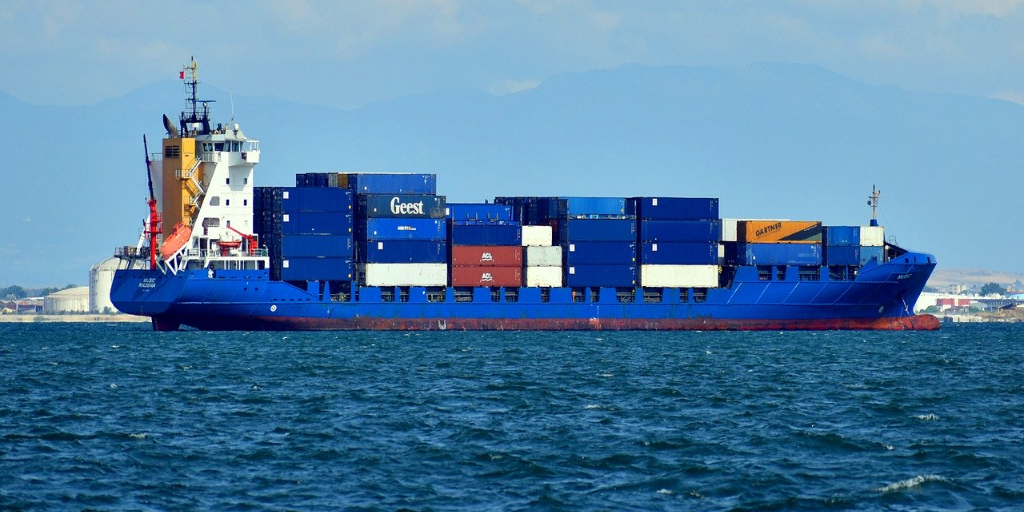Stranded at sea and confined on a ship—it’s like being in a floating prison: and no, I’m not talking about luxury cruises
Lesson summary
Thanks for joining us for another Plain English lesson; I’m Jeff; JR is the producer; and today is lesson number 272 and you can find the full lesson online at PlainEnglish.com/272.
On today’s episode: They an overlooked part of the mechanics of the world economy: the crews who work on cargo ships. And because of the pandemic, they are stuck on the world’s biggest tankers and container ships, unable to go home. In the second half of today’s audio lesson, we’ll talk about the phrase “grind to a halt.” You can find the full transcript of the audio lesson at PlainEnglish.com/272
Cargo crewmembers stranded at sea
I don’t care where you are right now: if you look around you, much of what you see crossed the ocean on a cargo ship in one form or another. That goes if you’re in a car, if you’re in an office, if you’re at home in your kitchen, if you’re lying in bed. Your clothes, your sheets, your electronics, furniture, parts of your car, knick-knacks, even parts of your last meal—a lot of it came to you courtesy of the large oceangoing vessels like container ships, cargo ships, tankers, and the like.
The world’s largest cruise ships have been called floating hotels; these cargo ships would be like floating warehouses or skyscrapers. They are the definition of an essential service: without them, a lot of global trade would grind to a halt. The lights in your house might even go out.
It takes between 20 and 30 people to operate these oceangoing behemoths. Some workers operate and maintain the engines; others are responsible for security and navigation. There’s always a kitchen crew. It’s not a glamorous job, no matter what the role is. The spaces are cramped, the amenities are few, the hours are long. Loneliness sets in. A crew generally goes several months of working 12- to 14-hour days, seven days a week. And they do not have high speed internet service to stream their favorite shows at night.
After a tour of several months, merchant crews get to go home for a few weeks or a few months to finally see their families again. That is, if there isn’t a global pandemic going on. Because right now, exhausted crews are stranded on board cargo ships and tankers, unable to set foot on land, unable to fly home.
Each ship may only have a handful of people on board, but the oceans are full of cargo ships. Over a million people are on global ships at any one time, on multi-month contracts. Officers serve for a few months at a time, while the more junior crewmembers typically serve on seven-month contracts. Now, an estimated 200,000 workers are stranded on board these ships. Their contracts have ended and they’re trying to get home. Another 200,000 are ready to start again, but can’t due to quarantine rules.
You might think that at the end of a tour, the crew can just hop onto dry land and go home. It’s not that simple. Shipping lines are global and their needs are ever-changing. Crews start and finish in global ports according to the shipping lines’ needs: these ports are often not adjacent to the crewmembers’ homes. They fly to the starting point and home from their final port of call. With international aviation shut down, many of them cannot fly home from the last port.
That’s not even the worst of it. Many of the world’s governments are not letting the crews off the ships at their ports. Oh, the goods still get unloaded: don’t worry about that. The port’s workers—the ones on dry land—are the ones who load and unload a cargo ship. The ship’s crew isn’t needed for that. And the world’s governments are not allowing the crewmembers to get off or change crews. Many can’t even see a doctor—not for COVID, but for routine medical care that crewmembers sometimes need when their ships are in port.
This isn’t just a problem for the crewmembers or their employers. After too much time at sea, crewmembers are exhausted and lonely. A small handful of people are navigating ships the size of large office towers; you don’t want those people to be exhausted or to be suffering from mental illness. Those floating warehouses often carry flammable or dangerous liquids. You might remember that one of the worst oil spills at sea, the Exxon Valdez spill in Alaska, was due to an exhausted officer making a navigational mistake.
Join Plus+ at the lowest-ever rate
Just a few days left to join Plain English Plus+ at the lowest-ever rate. This is good until the end of the day on June 30, just a few days away. This is your opportunity to lock in the best-ever price, for life, as part of Plain English Plus+ . As a reminder, our Plus+ members get access to audio at two speeds, translations in the transcripts, video lessons, a lively community, and much more. This special pricing for the earliest supporters is only valid until the end of the day on June 30, so if you’re considering joining, then make sure you visit PlainEnglish.com/Plus today and sign up. And look, if you’re not happy within the first month, no pressure. Just let me know and you can have your first payment back, no questions asked. That doesn’t happen often—only maybe two or three people have ever been unhappy in the first month, but it’s no big deal. I want everyone to be happy. So get that early price at PlainEnglish.com/Plus today.
Learn English the way it’s really spoken

